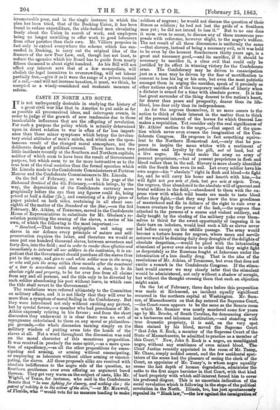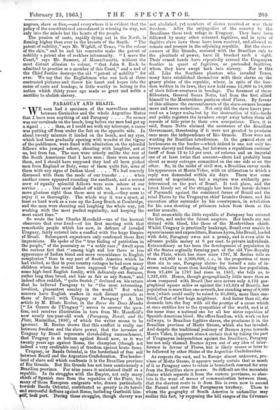CASTE IN NORTH AND SOUTH.
IT is not unfrequently desirable in studying the history of a great civil war like that in America to put aside as far as possible all preconceived ideas, and interrogate events, in order to judge of the growth of new tendencies due to those incalculable influences that are the offspring of revolution. For such a purpose the policy which is actually determined upon in direct relation to war is often of far less import- ance than those minor symptoms which betray the involun- tary social attitudes of men's minds, and which are the spon- taneous result of the changed moral atmosphere, not the deliberate design of political counsel. There have been two little incidents recently at the Southern and Northern capitals, neither of which seem to have been the result of Government purpose but which seem to us far more instructive as to the true bent of the rival societies than the formal speeches which Mr. Lincoln made to the Confederate Commissioners at Fortress Monroe and the Confederate Commissioners to Mr. Lincoln.
On the 3rd of February, as we read in the page of the Richmond Sentinel of the 4th February,—which brings, by the way, the depreciation of the Confederate currency more graphically before the eye than any figures- could do, being priced at half a dollar (2s.), and consisting of a dirty piece of paper printed on both sides, containing in all about one- eighth of the matter of the Standard or the Star,—on the 3rd February, Mr. Atkins, of Tennessee, moved in the Confederate House of Representatives to substitute for Mr. Gholson's re- solution permitting the arming of the slaves, a series of his own of which the following is the most important:— "Reeolved,—That between subjugation and using our slaves in our defence every principle of nature and self- preservation requires the latter, and therefore we would at once put one hundred thousand slaves, between seventeen and forty-five, into the field ; and in order to render them elective and immediately to interest all our soldiers in the institution, it is ex- pedient that the Government should purchase all the slaves thus put in the army, and give to each white soldier now in the army, or who will join the army within three months after the enactment of a law in accordance with these resolves, a slave, to be his absolute right and property, to be for ever free from all claims from any and all persons, and the title only to be diverted by such soldier abandoning his post without leave, in which case the title shall revert to the Government" The resolutions were referred ultimately to the Committee on military affairs, and it is not likely that they will ever be more than a symptom of moral feeling in the Confederacy. But they were introduced not only without exciting any protest, but by special favour,—a member who had precedence of Mr. Atkins expressly retiring in his favour ; and from the short discussion they underwent it is clear there was no sort of repugnance entertained to them on any moral or philanthro- pic grounds,—the whole discussion turning simply on the military wisdom of puttinea arms into the hands of the slaves at all. Not a word throughout the discussion was said on the moral character of this monstrous proposition. It was received in precisely the same spirit,—as a mere ques- tion of expediency,—as all the other propositions for eman- cipating and arming, or arming without emancipating, or employing as labourers without either arming or emanci- pating, the slaves. All these proposals alike are received with absolute indifference to the negro side of the question, no Southern gentleman ever even offering an argument based thereon. They get very warm on the subject of caste, like Mr. Wigfall, of Texas, for instance, who said in the Confederate Senate that "lie was fighting for slavery, and nothing else ; the patent of nobility is in the colour of the skin,"—or Mr. Maxwell, of Florida>, who "would vote for no measure tending to make soldiers of negroes; he would not discuss the question of their fitness as soldiers ; he had not lost the pride of a Southern man yet ; he did not intend to lose it." But to no one does it seem even to occur, to discuss any of these numerous pro- posals with reference, slight, to the negro's welfare. The net result of all these discussions is uniformly the same- -that slavery, instead of being a necessary evil, as it was held to be even by the keenest Southerners thirty years ago, is a great and necessary good,—and its sacrifice, if it should be necessary to sacrifice it, a clear evil that could only be justified by its effect in winninea victory for the Confederate arms. The Confederacy may be driven to emancipation just as a man may be driven by the fear of mortification to consent to lose his leg or his arm, but even the most patriotic amongst them in urging the sacrifice, speak of it precisely as other nations speak of the temporary sacrifice of liberty when a dictator is armed for a time with absolute power. It is the- last great surrender of the thing dearest to the nation's heart, far dearer than peace and prosperity, dearer than its life- blood, less dear only than its independence.
As for the negroes themselves, it no more occurs to the- nation to think of their interest in the matter than to think of the personal interest of the horses for which General Lee- makes a requisition. 1'et consider only the real significance, of Mr. Atkins' motion to the negro,—that aspect of the (pies. tion which never even crosses the imagination of the Con- federate Congress. He proposes in fact something equiva- lent to the Northern Homestead Act,—only that he pro- poses to inspire the mean whites with a sentiment of patriotism and loyalty by the gift, not of land, but of a live negro. He would make the army an army of peasant proprietors,—but of peasant proprietors in flesh and blood rather than in the soil. Slavery is more closely identified with the South than even its soil. Let every soldier have his. own negro—his "absolute" right in flesh and blood—to fight for, and he will carry his home and hearth with himi—he will fight not pro aris et focis, but pro aris et nigris. True, the negroes, thus abandoned to the absolute will of ignorant and brutal soldiers in the field,—abandoned to them with the ex- press view with which wild beasts are made to taste blood before they fight,—that they may know the true greediness of masterhood and die in defence of the right to rule over a human creature by the power of the lash,—the negroes thus attached to the persons of a coarse and violent soldiery, and daily tang& by the ehafing of the military yoke over them. selves to thirst for the sweet opportunity of imposing it in their turn on inferiors, would lead such a life as slaves never led before except on the middle passage. The army would becomn a torture-house for negroes, where mean and servile natures would be draining daily deep draughts of the delights.of absolute despotism,—would be plied with the intoxicating stimulant of power over slaves in order that they might fight as desperately as the Russians fought at Inkerman under the intoxication of a less deadly drug. That is the idea of the resolutions of Mr. Atkins, of Tennessee, but even that does not excite a remark in the Confederate Congress. If the stimu- lant would answer we may clearly infer that the stimulant would be administered, not only without a shadow of scruple,. but without the thought crossing them that such an objection might exist.
On the 1st of February, three days before this proposition was made at Richmond, an incident equally significant occurred in the northern capital at Washington. Mr. Stun, ner, of Massachusetts on that day entered the Supreme Court,- -the Court-room appears to be the same as the Senate-room in which Mr. Sumner was nearly murdered some few years ago by Mr. Brooks, of South Carolina, for denouncing slavery as a barbarous and inhuman institution,—and standing with true dramatic propriety, it is said, on the very spot then stained by his blood, moved the Supreme Court "that John S. Rock, a member of the Supreme Court of the State of Massachusetts, be admitted to practise as a member of this Court." Now, John S. Rock is a negro, an unmitigated negro, without any semblance of even mixed blood. The Chief Justice recently appointed in the room of Mr. Taney, Mr. Chase, simply nodded assent, and the few accidental spec- tators of the scene had the pleasure of seeing the clerk of the Court, an appointee of Mr. Taney's, to whom negro equality seems the last depth of human degradation, administer the oaths to the first negro barrister in that Court, with that kind of hard propriety with which self-interest forced him to cover his profound disgust. This is no uncertain indication of the social revolution which is following in the steps of the-political revolution in the North. Illinois, too, has just spontaneously repealed its "Black law,"—the law against the immigration of negroes, slave or free,—and everywhere it is evident that the policy of the constitutional amendment is winning its way, not only into the minds but the hearts of the people.
The passion of caste, rapidly dying out in the North, is flaming higher than ever in the breasts of the South. "The patent of nobility," says Mr. Wigfall, of Texas, "is the colour of the skin," and he and his comrades make the patent of nobility a patent also of reckless inhumanity. "I move the Court," says Mr. Sumner, of Massachusetts, without the most distant allusion to colour, "that John S. Rock be admitted to practise as a member of this Court," and a nod of the Chief Justice destroys the old "patent of nobility" for ever. We say that the Englishman who can look at these contrasted pictures and throw his heart and hopes into the cause of caste and bondage, is little worthy to belong to the nation which thirty years ago made so great and noble a sacrifice to abolish slavery.



































 Previous page
Previous page